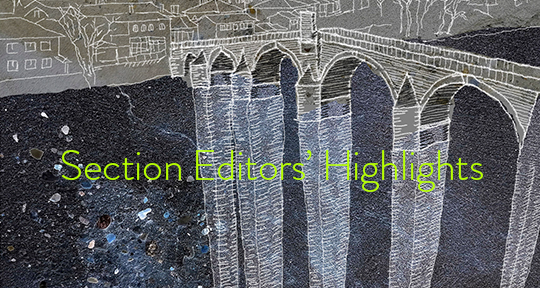The brand-new Summer 2021 edition of Asymptote is barely ten days old and we are still enjoying the diverse offerings from thirty-five countries gathered therein. Last week, blog editors Xiao Yue Shan, Allison Braden, and Shawn Hoo shared their favorites. Today, section editors Lee Yew Leong, Bassam Sidiki, and Caridad Svich distill their highlights for us:
From Lee Yew Leong, Fiction, Poetry, Special Features, and Interview Editor:
Why do so few men read fiction by women? lamented MA Sieghart as recently as seventeen days ago in The Guardian. With female authors taking five out of six slots, the Summer fiction lineup, published just in time for #WomeninTranslation month, offers parochial-minded readers a taste of what they are missing out on. These stories are also deeply centered on the female experience: Gabriel Payares and Maša Kolanović deliver unsettling takes on pregnancy and new motherhood, while the aging protagonists of Kathrin Schmidt’s and Can Xue’s stories go on mushroom-fueled head trips that seem to set the universe right again. A third set explores the corrosive effects of work on identity (in particular, Joanna Chen’s superb translation of mechanical engineer Tehila Hakimi’s Company recalled for me Amelie Nothomb’s masterpiece Fear and Trembling).
When you don’t go by a Judeo-Christian name, the constant bracing against mispronunciation can result in estrangement from your own identity, as Xiao Yue Shan explored in her recent essay on linguistic exile. I can relate. That’s why I found the ending of Abdushukur Muhammet’s “My Name” deeply moving. Translator Munawwar Abdulla not only does an excellent job nailing Muhammet’s melancholic voice, but also provides much needed contextualization in her translator’s note that imbues the poem with a sharp political layer. Accumulating brilliant specificity, Lêdo Ivo’s “The Earth Is Round” soars to great heights but also catches unawares with looser lines like this: “Life itself is a round thing / so that when we go wrong, we go wrong roundly.” Along with Hatem Al-Zahrani’s “I Need the Ordinary” (don’t miss the Saudi poet’s wonderful recording), it’s probably my favorite poem of the entire issue.
I already mentioned the essay by Gitanjali Patel and Nariman Youssef, the review by Vesna Goldsworthy, and the interview with Bruno Latour as my three personal highlights in the editor’s note, so I won’t say more other than to stress that they are all well worth your time.
From Bassam Sidiki, Nonfiction Editor:
The running theme for the Summer nonfiction lineup has been the generative and suggestive tension I discern in these pieces between isolation, stasis, and insularity on the one hand and community, migration, and connection on the other. I would especially encourage our readers to draw links between the resonances of home and belonging in Dora Kapralova’s masterful essay on the island of Menedek in the Danube and Hoda Barakat’s poignant reflection on the Lebanese diaspora. I would also recommend they read Li Cunyan’s absolutely entertaining travelogue “Journey to the West” together with Pedro Plaza Salvati’s GPS-like politically oriented walking tour of Caracas, accompanied by photographs–how do these two pieces formally experiment with conventional travel accounts? Finally, readers can find these two sets of themes of isolation and movement converge in the excerpt from Hwang Sok-yong’s forthcoming political memoir, The Prisoner, which, even as its identifies both South Korea and West Berlin in the 1980s as “islands,” attempts to draw connections between them.
From Caridad Svich, Drama Editor:
The Drama section this time features two contrasting pieces—one from Lithuania and another from Brazil. Each deals with matters of property, colonialism, patriarchy, gender and class. The Master by Marius Ivaskevicus, translated by Kotryna Garanasavili, is a playful, lightly comic, mordant piece about Balzac, Chopin, George Sand and how this fiery demimonde is confronted in a subtle manner with difficult questions around the subject of “mastery.” No! Not Namibia! by Aldri Anunciacao, translated by Almiro Andrade, is a provocative, urgent dramatic piece about Black liberation and repressive and oppressive acts of settler colonialism and white supremacy. Both dramas are sensitively translated and shed light on voices that need be wider known in the field of drama.

